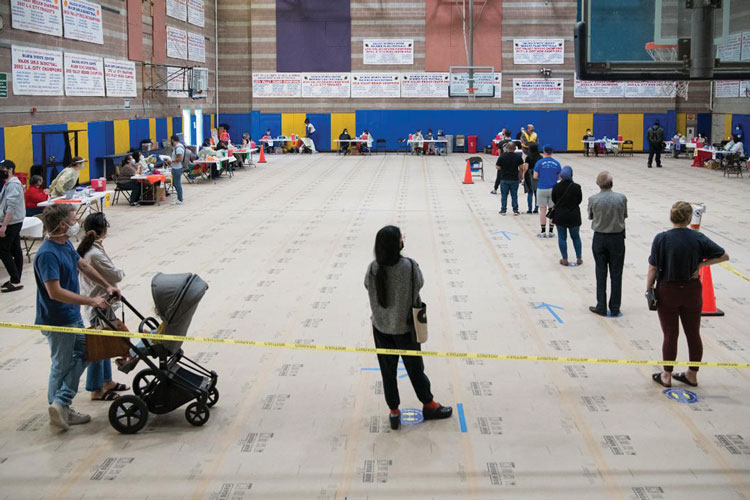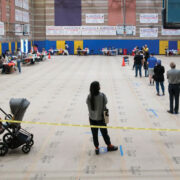
AS of Monday, March 1, eligibility for the coronavirus vaccine expanded to include workers in education, emergency services and food service.
But website errors in the state’s My Turn COVID-19 vaccine appointment system — which has been exploited by wealthier and more privileged people who are securing appointments intended for people in underserved neighborhoods — are making the process of actually getting an appointment extremely difficult for many LA County residents, as first reported in the Los Angeles Times.
Since the beginning of vaccine distribution, California has ordered counties to prioritize people living in highly impacted areas and those working in front-line essential jobs.
However, the My Turn website does not strongly factor that strategy into its algorithm, allowing for people who aren’t essential workers or aren’t currently eligible to receive the vaccine to secure appointments; it’s become an accepted notion that even if you turn up to an appointment and fail to prove eligibility, you won’t be turned away due to the possibility of unused vaccine doses expiring.
“My Turn is wide open and you can’t restrict access to appointments to people who are ineligible categories,” Dr. Barbara Ferrer, director of LA County Public Health, said at a press briefing on Wednesday, March 3.
Several vaccine supersites — the so-called mega-point of distribution (POD) sites — like Dodger Stadium, the Forum in Inglewood and Cal State Northridge were this week designated for food and agricultural workers, but Ferrer said “we really had no way to restrict people in making appointments in the system if they were eligible.”
To combat these issues, community vaccine sites have urged residents to call the LA County call service to secure appointments. Some vaccine sites, like the White Memorial Medical Center in Boyle Heights, have allowed people to register for vaccine appointments on-site.
On Wednesday, the California Department of Public Health (CDPH) said in a statement that the state has a COVID-19 hotline (833-422-4255) to assist residents who don’t have internet access or who would prefer to set up an appointment over the phone.
Ferrer said that the state is working to expand appointment-by-telephone services for those who don’t have access to a computer and internet.
“When [My Turn] gets fixed, it’s going to have to allow for the variation that’s needed county-by-county,” Ferrer said. “I’ve talked with some counties, for example, where what they’d like to [do is] vaccinate farmworkers who are 50 and older before they vaccinate farmworkers who are younger, or because they have very limited supply. So you need a system that actually allows you to make your appointments that way, particularly since the state would like everybody to start using My Turn.”
For Victoria Anderson, a Filipina American daycare worker in East LA, the process of finding an open appointment on My Turn was “impossible.”
“I kept refreshing the page, trying to go on it on my phone, then to my computer, but I wasn’t seeing any appointments available, even though it confirmed that I was eligible for the vaccine,” Anderson told the Asian Journal in a phone interview on Thursday, March 4.
Anderson also shared that her husband, who works as an ambulance driver for a private ambulance service, has also had difficulty navigating the site. Both have yet to receive their vaccines.
“It’s really disheartening when you see lots of privileged people who have been working from home and don’t necessarily work in essential positions get their vaccines so easily. They don’t work in industries where there’s this really unreasonable pressure to reopen right away like there is in [education],” Anderson added, saying she’s going to keep trying to secure an appointment for her and her husband.
For 58-year-old Patty Ong — who works in food service and has an underlying condition that would escalate if she contracted COVID-19 — the process of actually getting vaccinated wasn’t as difficult as the process of securing the appointment. She said she was vaccinated on Thursday but found difficulty with the My Turn and Cal Vax — the CDPH’s vaccine portal — websites.
“They wouldn’t show any available appointments and so I had to make some phone calls, first to my doctor who told me to call the county where I was eventually allowed to set up an appointment,” Ong told the Asian Journal on Friday, March 5. “Something this important shouldn’t be difficult, especially for those of us who are, you know, a bit older and aren’t as good with online stuff.” Ong ended up getting her vaccine at Cal State LA, where she had to wait about 30 minutes before she got her first shot.
“It was kind of messy, to be honest. There were lots of people who didn’t have appointments even though they said you couldn’t get in without an appointment, so there were people registering,” Ong said.
Ong said the vaccine shot itself wasn’t as nerve-wracking as she thought it would be, describing the experience “like getting a flu shot.” And she added that “all the stress and frustration that led up to that moment didn’t make sense.”
For Jenn de la Fuente, an adjunct professor at USC, the process was easy, but not because any of the online portals to set up an appointment worked for her. She got her first dose of the Pfizer vaccine on Thursday at a pharmacy in San Dimas, which is more than 30 miles away from where she lives in Glendale.
She happened to know someone who owns a pharmacy in San Dimas which was distributing vaccines to eligible people, and since de la Fuente works in education, the friend invited her to get her vaccine shot there.
“I would’ve preferred to get the vaccine closer to home but it’s really hard to get an appointment,” she said, mentioning that she tried booking through My Turn and other county resources.
“I just got really lucky and I feel really fortunate that for me, it was an easy process,” she said. She mentioned that while she was in line for the vaccine, she met K-12 teachers who shared that they signed up for appointments on their own rather than following school districts’ advice to wait.
“I feel like being able to get the vaccine means I’m doing my part to help society. At USC, we were already told that we are coming back for the fall and being in-person, and I’m really excited about that. It’s been really difficult I think, not only from the standpoint of being a professor, but for students because it’s really hard to do an entire year virtually,” de la Fuente said.







